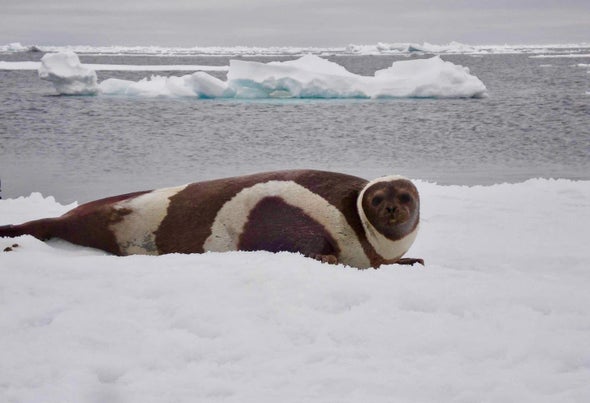(单词翻译:单击)
听力文本
This is Scientific American's 60-second Science, I'm Christopher Intagliata.
The Arctic is warming twice as fast as the rest of the planet, meaning more and more sea ice is melting every year.
"It's really concerning—the rapid loss of sea ice up there—for a lot of reasons."
Tracey Goldstein, a researcher and conservationist at U.C. Davis. She says one of those reasons is animals like ice seals need the ice to haul out on and give birth. Another reason? As the Arctic warms, the fish the seals eat may be moving to deeper and colder waters. So the seals have to travel farther to hunt them.
"So the combination of all of that over time is probably going to affect their health and their body condition. And that will make them not just underweight but also more susceptible to other diseases."
And those diseases may also be encroaching upon arctic marine mammals because (spotting a trend here?) Arctic sea ice is melting.
"Totally unintended consequence of all that, but yes. When there used to be an ice bridge, certain populations would remain separate from each other, so they couldn't come in contact and give each other their bacteria, their viruses, et cetera. But once those channels started to open, animals were able to move further and came into contact with new species they hadn't come into contact with in the past."

Goldstein and her colleagues documented the spread of a disease called phocine distemper virus from 2001 through 2016. It's related to the measles and causes skin lesions, coughing, pneumonia, seizures and sometimes death in marine mammals.
Goldstein's team scanned historical and contemporary marine mammal blood samples for antibodies against the virus. They also hunted for evidence of live infections in nasal swabs taken of mammals. And they found that flareups of the virus were linked to years with extreme losses in sea ice—suggesting that open waters aided the spread of the pathogen, perhaps along the melted coastline north of Siberia.
Their analysis is in the journal Scientific Reports.
Mammals that depend on ice to survive may already be slated for extinction as the Arctic melts, Goldstein says. And more frequent epidemics like this viral one could hasten the blow. But humans may also be affected.
"Up in the Arctic, people subsist on these species, so they really rely on these animals for their livelihood and well-being. And as those animals disappear, or as their habitat disappears, that's also going to heavily affect humans in that area. So overall, I think the overall health of the environment and the animals and the people up in the Arctic over time is just going to continue to deteriorate."
Unless, of course, we humans take meaningful action to slow the planet's warming.
Thanks for listening for Scientific American's 60-second Science. I'm Christopher Intagliata.
参考译文
这里是科学美国人——60秒科学系列,我是克里斯托弗·因塔格里塔。
北极正在变暖,而且变暖速度是地球其他地区的两倍,这意味着每年有越来越多的海洋融化。
“北极海冰因众多原因而迅速消失,这的确令人担忧。”
加州大学戴维斯分校的研究员和自然环境保护主义者特雷西·戈尔茨坦说到。她表示,其中一个原因是,冰海豹等动物需要浮出水面,停在冰上并进行生产。另一个原因呢?随着北极变暖,海豹食用的鱼可能会迁往更深更冷的水域。因此,海豹不得不游到更远的地方去捕食它们。
“随着时间的推移,所有这些因素结合起来可能会影响海豹的健康和身体状况。这会使海豹不仅体重不足,而且更容易患上其他疾病。”
这些疾病可能还会侵蚀北极海洋哺乳动物(发现趋势了吗),因为北极海冰正在融化。
“这完全是意料之外的结果,但确实如此。当曾经有一座冰桥的时候,某些种群会彼此隔离,所以它们无法接触到彼此,也不会将它们的细菌、病毒等传染给对方。但一旦这些通道开始打开,那动物们就能进一步移动,接触到以前没有接触过的新物种。”
戈尔茨坦及其同事记录了一种名为“海豹瘟热病毒”的疾病从2001年到2016年的传播情况。它与麻疹有关,在海洋哺乳动物中引起皮肤损伤、咳嗽、肺炎、癫痫,有时甚至会导致死亡。
戈尔茨坦的团队扫描了历史和当代海洋哺乳动物的血液样本,以寻找对抗病毒的抗体。他们还在哺乳动物的鼻腔内寻找活感染的证据。他们发现,病毒的爆发与多年来海冰的极度减少有关,这表明开放的水域助长了病原体的传播,也许是沿着西伯利亚北部融化的海岸线。
他们的分析发表在《科学报告》期刊上。
戈尔茨坦说,随着北极的融化,依靠冰生存的哺乳动物可能已经濒临灭绝。而像这种更频繁的流行病可能会加速这一打击。但人类也可能受到影响。
“在北极地区,人们依靠这些物种生存,他们的生活和幸福真的依赖这些动物。随着这些动物的消失,或者它们栖息地的消失,也会对该地区的人类造成严重影响。因此,我认为,随着时间的推移,北极环境、动物和人类的整体健康状况将继续恶化。”
当然,除非我们人类采取有意义的行动来减缓地球变暖。
谢谢大家收听科学美国人——60秒科学。我是克里斯托弗·因塔利亚塔。
译文为可可英语翻译,未经授权请勿转载!
重点讲解
重点讲解:
1. give birth 生(孩子);分娩;生育;
She died shortly after giving birth.
她生下孩子后不久便死了。
2. be susceptible to 易受(伤)的;易患(病)的;体质过敏的;
Some of these plants are more susceptible to frost damage than others.
这些植物中有一些较其他的易受霜冻危害。
3. be slated for 预定;计划;安排;
The houses were first slated for demolition five years ago.
这些房子在五年前就确定要拆除了。
4. subsist on 勉强糊口;勉强度日;
Old people often subsist on very small incomes.
老人往往靠十分微薄的收入艰难度日。


